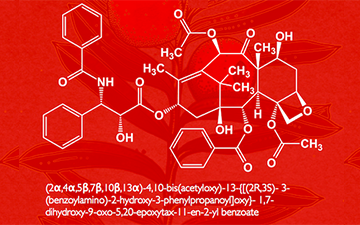Paclitaxel is a medication used to treat a number of types of cancerincluding: ovarian cancer, breast cancer, lung cancer and pancreatic cancer among others.[2] It and docetaxel represent the taxane family of drugs. Paclitaxel’s mechanism of action involves interference with the normal breakdown of microtubules during cell division.
Common side effects include: hair loss, muscle and joint pains, and diarrhea, among others.[2] It results in a greater risk of infections which can be potentially serious.[2] Use during pregnancy often results in problems in the infant.[2]
Paclitaxel was discovered in 1962[3] as a result of a U.S. National Cancer Institute-funded screening program; being isolated from the bark of the Pacific yew, Taxus brevifolia, thus its name “taxol”. Developed commercially by Bristol-Myers Squibb, the generic name has changed to “paclitaxel” with atrademark becoming Taxol. Other trademarks include Abraxane. Clinicians sometimes use the abbreviation “PTX” for paclitaxel, which is discouraged, because it is not a unique identifier.
Paclitaxel is on the World Health Organization’s List of Essential Medicines, a list of the most important medication needed in a basic health system.[4]There was initially concern over the environmental impact of its initial sourcing from the slow growing Pacific yew. In addition, both the assignment of rights to Bristol-Myers Squibb and the product name were subject to public debate and Congressional hearings.
(From Wikipedia, June 2015)


